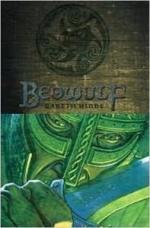[1] ‘Meodu-scencum’
(1981) some would render ‘with mead-pourers.’
Translate then: The
daughter of Haereth went through the building
accompanied by mead-pourers.
[2] See my note to 1599, supra, and B. in P. and B. XII. 97.
[3] For ‘fenne,’
supplied by Grdtvg., B. suggests ‘facne’
(cf. Jul.
350). Accepting this,
translate: Who longest lives of the hated race,
steeped in treachery.
[4] See note to v. 1599 above.
[5] This is perhaps the least understood sentence in the poem, almost every word being open to dispute. (1) The ‘no’ of our text is an emendation, and is rejected by many scholars. (2) ‘Seldan’ is by some taken as an adv. (= seldom), and by others as a noun (= page, companion). (3) ‘Leod-hryre,’ some render ‘fall of the people’; others, ‘fall of the prince.’ (4) ‘Bugeeth,’ most scholars regard as the intrans. verb meaning ‘bend,’ ‘rest’; but one great scholar has translated it ‘shall kill.’ (5) ‘Hwaer,’ Very recently, has been attacked, ‘waere’ being suggested. (6) As a corollary to the above, the same critic proposes to drop ‘oft’ out of the text.—t.B. suggests: Oft seldan waere after leodhryre: lytle hwile bongar bugeeth, þeah seo bryd duge = often has a treaty been (thus) struck, after a prince had fallen: (but only) a short time is the spear (then) wont to rest, however excellent the bride may be.
XXX.
BEOWULF NARRATES HIS ADVENTURES TO HIGELAC.
“It
well may discomfit the prince of the Heathobards
And
each of the thanemen of earls that attend him,
[70] When he goes to the building escorting the
woman,
That
a noble-born Daneman the knights should be feasting:
5
There gleam on his person the leavings of elders
Hard
and ring-bright, Heathobards’ treasure,
While
they wielded their arms, till they misled to the battle
Their
own dear lives and beloved companions.
He
saith at the banquet who the collar beholdeth,
10 An ancient
ash-warrior who earlmen’s destruction
Clearly
recalleth (cruel his spirit),
Sadly
beginneth sounding the youthful
Thane-champion’s
spirit through the thoughts of his bosom,
War-grief
to waken, and this word-answer speaketh:
{Ingeld is stirred up to break the truce.}
15 ’Art
thou able, my friend, to know when thou seest it
The
brand which thy father bare to the conflict
In
his latest adventure, ’neath visor of helmet,
The
dearly-loved iron, where Danemen did slay him,
And
brave-mooded Scyldings, on the fall of the heroes,
20 (When
vengeance was sleeping) the slaughter-place wielded?




